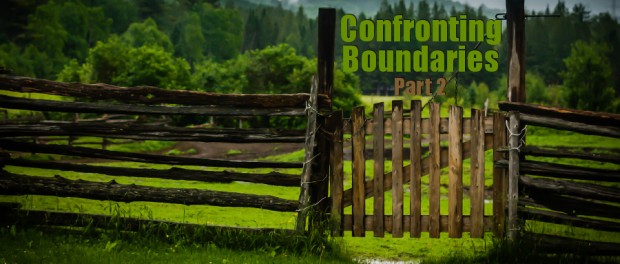Confronting Boundaries — Part 2

Much of life, even Christian life, requires a keen sense of boundaries. We’ve seen we’re accountable for boundaries we have inside us according to James 4:17, so we’re well-served by ensuring our boundaries are built upon God and not something arbitrary. Even if it’s my dear grandmother’s rule, It’s never too sacred for a confrontation to reassess before adopting it as my own.
I take a systematic, methodical approach when confronting boundaries (or assessing any potential truth) because it produces reliable results. I’ve adapted John Wesley’s quadrilateral to this task, since my personal boundaries are essentially doctrine or truth applied to me personally.
I apply his four components in a specific hierarchical order. In my last post, I addressed the first two components, Scripture, which trumps all else, and reason, which steps in when Scripture is silent, ambiguous, or indifferent. But what if this tag team fails to give me a definitive answer? Well, the quadrilateral has two more sides, and I start on the next step.
Experience
Wesley and others feel it’s safe to assume God crafted the human race to experience life as it really is. In other words, when we see a blue sky, it’s because it actually is blue. God didn’t make our senses in such a way that they lie to us about reality. The sky is not brown, or seven, or chimpanzee. It’s blue. Our experience reflects some measure of truth, if only a portion of it.
Like with our reason, we must remain cognizant of our fallen and human state. Our sin nature corrupts our experience on some level, and our experience is inherently subjective. We only experience life in our own shoes. So, in this system, our experience must be overruled by our objective reasoning, and both must be overruled by flawless, inerrant Scripture. But our experience still tells us something real about the situation.
For example, let me take you back to my bachelor days with a little TMI. Should I impose a personal boundary on masturbation? Contrary to some claims, the Bible appears to be silent on masturbation itself. Reason is equally indifferent; it sees no medical or physical harm or benefit in the act itself.
God didn’t make our senses in such a way that they lie to us about reality. The sky is not brown, or seven, or chimpanzee. It’s blue.
Experience is invaluable because it can reflect an element of truth not cited by the first two sides of the quadrilateral, but sometimes it fails us, too. It may fail because it offers no insight or because our insight is too limited by our narrow slice of experience or because our insight is too tainted by sin to be reliable.
Tradition
Enter church tradition. Throughout history, many very wise and well-studied men and women have recorded their insights on many of the topics that inform boundaries. Going back to resources like Origen and Augustine or even the Council of Nicaea, all the way forward to more recent writers or events like C.S. Lewis or Gregory Boyd or the Vatican II, a rich collection of resources remains for us to glean from.
However, note tradition’s final position in the sequence. There’s good reason for this.
The church doesn’t get to go against the Bible, though my Roman Catholic friends may agree to disagree; sola scriptura adherents believe conflicts between the Bible and anything else aren’t really conflicts at all because the Bible always wins (though we might not always understand why or how, which is why the Bible also trumps reason and experience).
The church also doesn’t get to override reason. I don’t forfeit my reason because I attend church and study tradition. This is only logical, since two millennia of church tradition has produced often conflicting views (even the few generations between Origen and Augustine demonstrate drastic changes), leaving us to call upon reason to make sense out of it anyway. Plus, of course, there’s the tragically comical irrationality the church has demonstrated in the past.
Going back to resources like Origen and Augustine or even the Council of Nicaea, all the way forward to more recent writers or events like C.S. Lewis or Gregory Boyd or the Vatican II, a rich collection of resources remains for us to glean from.
Still, church tradition is a valuable resource to seek answers when confronting boundaries.
Applying All Four Sides
So, as I prayerfully assess a boundary, I ask what the quadrilateral indicates. If it’s silent, and I don’t hear from God, I tentatively opt for personal preference and wisdom, knowing God may move the boundary I place. But if my boundaries conflict with the quadrilateral, I consider them suspect and must be prepared to cut them or replace them with more suitable alternatives.
I don’t intend to aggressively hold a line just because my parents did, my pastor does, or it’s a habit I’ve always had. Or because it’s popular and accepted. Even by Christians.
Nothing is too sacred to reconsider when I’ll be held accountable for what I know.
Originally posted 2015-03-02 08:00:56.


Leave a Reply